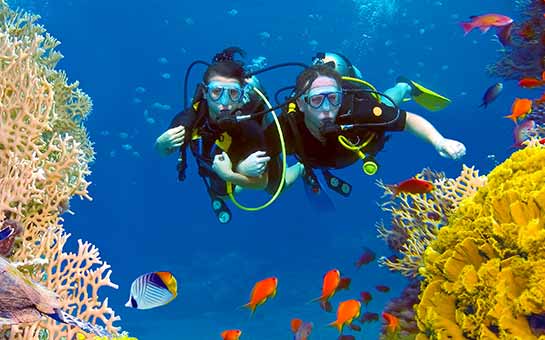Scuba diving is one of the most fascinating adventure sports to engage in during a beach vacation. Life underwater can be an awesome, tranquil, colorful, and immersive experience. Since it is classified as an extreme water sport, specialized travel insurance for scuba diving is a necessity.
Travel Insurance for Scuba Diving
Most travel insurance policies do not cover hazardous water sports. You would need to specifically apply for travel insurance for scuba diving if you have plans to go diving during vacation.
Especially if you’re out in open water, the diving area is likely to be far from medical facilities. Injuries and accidents would necessitate immediate medical intervention. The experience could be quite traumatic and confusing for you and your companions if it were to happen in a foreign land. But, with travel insurance for scuba diving, you will at least know that the financial aspect of the situation is taken care of.
Many diving clubs and shops will make you sign a disclaimer. Thus, your safety becomes your responsibility. If you need any medical assistance, it may come with a hefty cost. Scuba diving travel insurance will ensure your cost coverage and help your recovery to the maximum.
Your scuba diving travel insurance may provide coverage for:
- Transportation from the diving site to the hospital.
- Medical and rehabilitation costs.
- Additional transportation costs if you are flown home under special conditions.
- Fines that you need to pay if you cause injury to another diver.
With reliable and well-researched coverage, your scuba diving trip will turn into a memorable and fun experience. If you have any questions or require further information about the best travel insurance for scuba diving, our licensed, experienced representatives are just a phone call away.
What Types of Scuba Dives Are Covered?
Scuba diving travel insurance typically covers a wide range of dives, ensuring you can enjoy underwater adventures with peace of mind. Recreational scuba diving is covered for qualified divers to depths of 165 feet (50 meters) under most standard plans. For more advanced dives, plans like the Explorer and Epic options may cover cavern and cave diving to depths of 196 feet (60 meters), as well as free diving. Discovery dives, conducted with certified instructors, and shark cage diving are also generally included under higher-tier policies.
Additionally, some plans extend to cover snorkeling, live-aboard trips, and other water-related activities. However, the extent of coverage depends on the specific plan chosen, so it’s vital to confirm details beforehand. With proper insurance, you can explore coral reefs, wreck dives, and unique marine ecosystems without the worry of financial risks.
What is NOT Covered by Scuba Diving Travel Insurance?
Scuba diving travel insurance excludes specific scenarios to ensure safety and compliance with policy terms. Diving without certification, except for supervised discovery dives, is not covered. Similarly, diving deeper than the maximum depth allowed by your plan, or engaging in professional sports or competitions, will void your coverage.
Activities like diving under the influence of drugs or alcohol, entering restricted zones, and participating in unsanctioned expeditions are also excluded. Damage to equipment while in use or leaving gear unattended is generally not covered. Additionally, insurance will not cover pre-existing medical conditions unless explicitly addressed in the policy.
For complete protection, follow all safety protocols, dive within the plan’s approved limits, and ensure you’re diving with reputable operators. This proactive approach helps avoid risks and ensures a smooth and enjoyable scuba diving experience.
Basics of Scuba Diving
The term “SCUBA” is an acronym that stands for “Self-Contained Underwater Breathing Apparatus”. Scuba divers use a breathing apparatus to breathe underwater.
During scuba diving, the diver is completely cut off from the surface air supply. Divers wear special equipment with attached air tanks. These tanks contain a combination of nitrogen, oxygen, and other necessary gases. Divers also need to wear a diving suit with special fins attached to the feet to assist with mobility underwater.
You have to be careful of the speed at which you dive and resurface. Moving too quickly and hastily could harm your apparatus, your air supply, and the marine life around you. If you have never gone scuba diving before, it is advisable to dive with an expert until you feel more comfortable.
Scuba diving is a popular recreational activity for tourists in many places across Asia, Europe, the Caribbean Islands, and the Great Barrier Reef near Australia.
Risks of Scuba Diving
Most recreational scuba diving is comparatively safer if you have a divemaster with you. Though fatality rates are not very high for recreational scuba diving, there are risks in this activity.
Most of the risks arise out of the mishandling of equipment, improper gas and buoyancy management, and environmental circumstances such as entrapment and rough water. Decompression sickness and gas embolisms are serious medical issues that would require immediate treatment.
For recreational divers, most risk comes from a combination of limited physical capability, infrequent diving, inexperience, and insufficient training.
In general, your risk management would involve three important steps before you go scuba diving as a tourist.
- Assessment of risk
- Emergency planning
- Scuba diving travel insurance
Don’t forget to ask previous divers and other tourists for feedback and reviews. Choosing a reputable and competent scuba diving club will take care of your safety.
